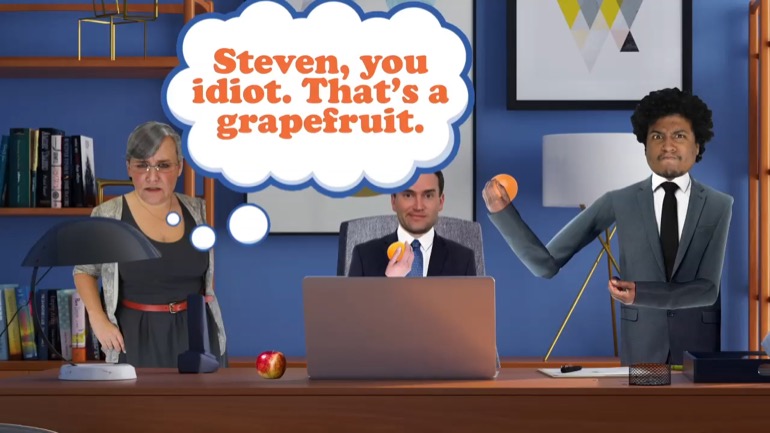ShmoopTube
Where Monty Python meets your 10th grade teacher.
Search Thousands of Shmoop Videos
Muni Bonds Videos 71 videos
Maturity is, quite simply, the date when a debt becomes due. As for our maturity, well... we're still giggling about the word "due."
What are Freddie Mac and Fannie Mae? They sound like snack cakes to us, so, uh...maybe we should watch this video.
What are Bond Anticipation Notes (BANS), Revenue Anticipation Notes (RANS), and Tax Anticipation Notes (TANS)? BANS, RANS and TANS are all short-te...
Finance: What is Yield to Maturity? 7 Views
Share It!
Description:
What is Yield to Maturity? When calculating bond yields, the yield to maturity is the interest rate that an investor would ultimately accumulate if the interest coupon payment were to be reinvested on a regular fixed rate until maturity. This could be viewed as analogous to compound interest on a savings account. It is also referred to as the Internal Rate of Return.
- Social Studies / Finance
- Finance / Financial Responsibility
- College and Career / Personal Finance
- Life Skills / Personal Finance
- Finance / Finance Definitions
- Life Skills / Finance Definitions
- Finance / Personal Finance
- Courses / Finance Concepts
- Subjects / Finance and Economics
- Finance and Economics / Terms and Concepts
- Terms and Concepts / Bonds
- Terms and Concepts / Derivatives
- Terms and Concepts / Ethics/Morals
- Terms and Concepts / Investing
- Terms and Concepts / Metrics
- Terms and Concepts / Muni Bonds
- Terms and Concepts / Mutual Funds
- Terms and Concepts / Regulations
- Terms and Concepts / Stocks
- Terms and Concepts / Trusts and Estates
Transcript
- 00:00
finance a la shmoop what is yield to maturity yield it's the dough you get
- 00:09
back from your investment in a bond here's a thousand-dollar bond here's the [pigeons sitting on a line]
- 00:13
coupon of 7% so the yield is 7% while the bond lasts for 10 years and then
- 00:19
after paying you 70 bucks a year for a fat and happy decade of sitting on your
- 00:23
Duff collecting your interest you get your grand back and well that's it right [check changes hands]
Full Transcript
- 00:27
um no well what happens if you bought that bond for nine hundred bucks or
- 00:32
twelve hundred bucks or some other random amount yeah way more complex well
- 00:36
there are two ways you make money from investing in a bond first there's the
- 00:40
interest as we just outlined 70 bucks a year the semi annual festival of dances [people dancing together]
- 00:45
when the interest payment is made right it's 35 bucks twice a year easy but then
- 00:49
there's the appreciation of the principle of the bond and yeah it could [flying crow starts inflating]
- 00:54
be depreciation of it - all right you bought a 6% yielding bond at a discount
- 01:02
to its thousand-dollar par value like say you paid 92 cents on the dollar nine
- 01:06
hundred twenty bucks for a thousand dollar par value bond well over ten
- 01:10
years you hold that bond until it matures it will appreciate in value I
- 01:14
call it - eight bucks a year and then it will pay to investors that thousand [check change hands]
- 01:18
dollar par value well yield to maturity which doesn't apply to shmoop writers
- 01:23
takes into account both sets of cash flows into your wallet the interest
- 01:27
yield plus the appreciation of the principle of the bond so in this case
- 01:31
the bond was paying interest of 60 bucks a year but then it also had appreciation
- 01:36
of eight bucks a year for a total of 6.8%
- 01:40
or 68 bucks a year in appreciation all right is this all there is to it you
- 01:44
just throw in a straight line number therefore the annual appreciation eight
- 01:49
bucks every year smoothly that's of the principle until it hits par and then
- 01:52
you're done no not at all life is never that simple all kinds of curveballs will
- 01:57
be thrown at you all over your head there and you think about you to [flying bird dodging balls]
- 02:01
maturity okay here's one for starters what about the time value of money
- 02:05
remember that thing ie the cash that you get twice a year in bond interest well
- 02:09
couldn't you reinvest that money elsewhere like it
- 02:12
moment the moment you collected 10 years earlier before bond matures and make
- 02:16
more money well sure you could and what about the application of straight-line
- 02:19
depreciation to the gain of 80 bucks over 10 years like why does the bond
- 02:23
depreciate exactly eight dollars a year in value instead of Raoh maybe less in
- 02:29
the early years and more in the later or or vice versa
- 02:33
yeah lots of curveballs and some of these are just accounting decisions or [businessman studying papers]
- 02:36
the way things are done and the way things are done in bond land is usually
- 02:41
driven largely by the way the IRS wants to tax you got it so that whole [Uncle Sam walking down the street]
- 02:45
straight-line depreciation thing and that's largely an IRS driver and here's
- 02:48
another some bonds are callable early so what if this bond was callable after
- 02:53
five years but at 102 or a $20.00 premium per bond or a thousand twenty
- 02:58
well then yeah the yield calculation is different and it's normally called out
- 03:02
as a quote yield to worst unquote or rather yield to the worst possible
- 03:07
outcome of the bond other than it going bankrupt or you know not paying on time [coins dropping]
- 03:12
in this case the yield to worst would be an appreciation from nine twenty two a
- 03:17
thousand twenty or a gain of a hundred bucks then over just five years so you'd
- 03:21
add twenty bucks a year to the dividends of sixty bucks a year and you'd get a
- 03:25
well at least a notional yield here then of eight percent right if the bonds were
- 03:29
in fact called at ten twenty thousand twenty bucks each got at eight percent
- 03:33
or does that yield to worst is that the worst you knuth know it's not the worst
- 03:36
at all the normal trajectory of this bond has it maturing in a decade and at
- 03:41
par not at a premium to par that ten twenty thing so it isn't bad to be a
- 03:45
yield to Wurster in this case it's just that if the bond is called early well [crow flying]
- 03:49
that would be the worst it would do other than like you know not pay off or
- 03:53
go bust and obviously this is all about appreciation when you buy it
- 03:57
depreciation you know works the same so just relist into this video in Reverse
- 04:02
and sometimes worst ain't so bad you [two birds on a line]
Related Videos
What's a dividend? At will, the board of directors can pay a dividend on common stock. Usually, that payout is some percentage less than 100 of ear...
GED Social Studies 1.1 Civics and Government
What is bankruptcy? Deadbeats who can't pay their bills declare bankruptcy. Either they borrowed too much money, or the business fell apart. They t...
How are risk and reward related? Take more risk, expect more reward. A lottery ticket might be worth a billion dollars, but if the odds are one in...










































































